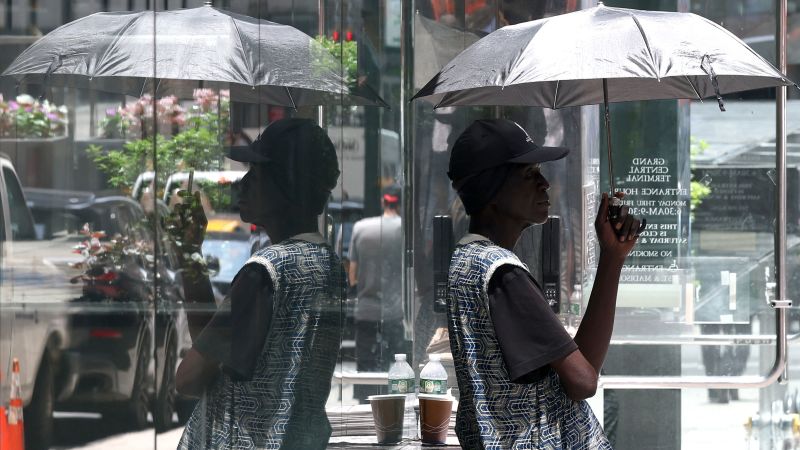A long-lasting extremeheat waveis reaching its dangerous crescendo Tuesday, likely bringing the hottest day in a decade to some major East Coast cities and putting millions of already fatigued Americans at risk.
The brutal conditions, spurred by a potentheat dome, are peaking Tuesday after Monday’s heat in the East reached levels rivaling summer’s hottest weather and started to take a serious toll.
Two high school graduations in Paterson, New Jersey, in Monday’s sweltering conditions sent 16 people to the emergency room and over 150 people were evaluated for heat-related illnesses, Paterson Fire Chief Alejandro Alicea told CNN.
In Baltimore, an Amtrak train stalled in a tunnel and left passengers trapped in the heat for over an hour Monday afternoon.
“I honestly thought I was going to collapse on the train, and I’m fairly young and in good shape,” passenger Laura Evans told CNN, adding several of the train’s cars were without air conditioning even at the start of the journey.
The extreme temperatures also prompted closures of some attractions, including the Washington Monument in Washington, DC, which closed Monday and remained closed Tuesday due to an Extreme Heat Warning, according to an alert on theNational Park Servicewebsite.
Nearly 160 million people in the eastern half of the US are under heat alerts Tuesday, according to the National Weather Service.
Heat remains thedeadliest formof extreme weather in the US. Globally, heat waves are becoming more frequent, more severe and longer-lasting as the world warmsdue to human-caused climate change. Nighttime temperatures are taking the hardest hit from climate change, and arewarming fasterthan daytime highs.
Extreme heat also takes a toll oninfrastructure, causing materials like concrete and asphalt to expand and warp. Parts of key thoroughfares in Milwaukee and Green Bay, Wisconsin, suburbs were closed after buckling under searing heat Sunday, local officials said. More than50 buckleswere reported in the state, according to the Wisconsin Department of Transportation. Similar scenes unfolded in Cape Girardeau, Missouri, andthe city warnedmore streets could crack as the heat persists.
Rail and air travel could face continued challenges as temperatures peak Tuesday.
Tuesday will likely be the hottest day of the week for many in the East, but a level4-of-4 extreme heat riskis in place through at least Thursday that stretches from the Midwest to the Mid-Atlantic and includes parts of the Northeast.
It feels more like July, summer’s hottest month, than June for many locations Tuesday as temperatures rise 15 to 20 degrees above normal. Triple-digit high temperatures will set in from the Carolinas north into southern New England – including every major I-95 city.
Tuesday in Boston could be hotter than it’s ever been in June. The forecast high of 101 degrees would break the June high temperature record and come within 3 degrees of the all-time record.
Philadelphia could also make a run for its all-time hottest June day – 102 degrees – with a forecast high of 101. A high of 101 degrees would also make Tuesday the city’s hottest-ever day this early in the summer. The city broke Monday’s daily high temperature record when it reached 99 degrees.
New York City could hit 100 degrees for the first time in over a decade on Tuesday. The city’s last triple-digit temperature happened on July 18, 2012, but it hasn’t been 100 degrees during June since 1966 – nearly 60 years. Like Philadelphia, a high of 100 degrees would make Tuesday New York’s hottest day this early in the season. Monday marked the city’s hottest day in nearly three years.
Washington, DC, is forecast to notch its first 100-degree day of the year on Tuesday – something that doesn’t typically happen until mid-July. A high of 101 degrees in the nation’s capital would break Tuesday’s daily record of 100 degrees.
Parts of the East Coast will start to see some relief from the historically hot weather Wednesday, though it’ll be a slow start.
Wednesday will still be very hot, but not quite as extreme for many. Record-breaking temperatures are possible, mainly in the mid-Atlantic, but triple-digit temperatures will be a thing of the past for the Northeast.
Heat more typical of late June will arrive on Thursday and continue into the weekend.
This heat wave is likely only the opening act of ahot summerto come for the East. A hotter than normal summer is expected for the entire Lower 48, according to the Climate Prediction Center.
